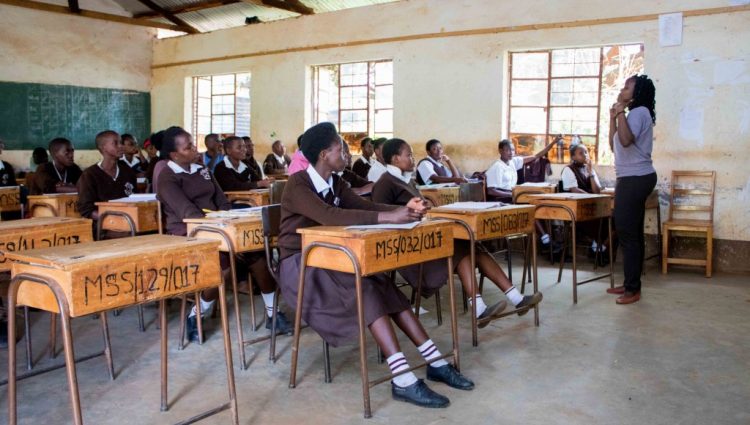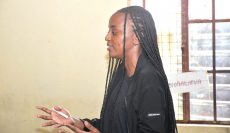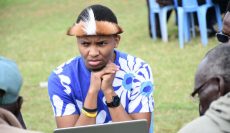|By Christina Garashie|
The Community Service Centre is involved in a number of projects whose aim is to empower individuals and communities using education, character development, and community engagement activities. These projects work with different groups of people, among them at least 10,000 high school students in Kitui, Kwale, Turkana, Kisumu and Nairobi. Most of our interventions address challenges affecting both genders with others being customised to suit those of the girls and boys separately. Of these customised interventions are the mentoring workcamps where the mentoring activities are carried out separately for the boys and girls.
Christina Garashie, who works in the Alumni Office and volunteers at the Community Service Centre, has been instrumental in promoting the education of school girls by spearheading the character education and life skills mentoring camps for female students. She speaks to us about it.
What does your work in girls’ education entail?
To improve learning outcomes, we work with university volunteers (SU staff, students and alumni) to support the educational experience of girls from the communities that we serve. Our program trains female university students who volunteer as mentors to the secondary school students. The volunteers facilitate character education, life skills and mentoring sessions for the school girls. They also try to bridge communication barriers that exist between the girls, parents and teachers by giving feedback as and when necessary. Our program also supports menstrual health and hygiene education and gives sanitary towels. In addition, our volunteers focus on career guidance among final year high school students and in smaller projects like Macheo, we ensure that we link students with scholarship opportunities both in high school and college. We run the mentoring work camps during the school academic terms and activities are carried out within the school compound for schools outside of Nairobi.
For the Macheo Achievement Program, students come to Strathmore University on Saturdays and during school holidays for tuition and other co-curricular activities. These high school students are also mentored by university volunteers. We encourage 2nd year university students to take up Form 2 mentees and walk them through high school such that by the time they are in 4th year, the high school students will also be at the tail-end of their secondary education. This ensures that the Macheo students are well-taken care of throughout their high school years.
To foster these bonds, weekend conferences are organized in Kianda Residence where female university mentors and their mentees spend more time with each other and engage in shared activities throughout the weekend. This has catalyzed the formation of friendships that could last a lifetime.
We also are keen on parental engagement and teacher training which we have incorporated in all our programs. In Strathmore, we have partnered with the Teachers Enhancement Program (TEP) and the Program for Family Development (PFD) to ensure a holistic program that will transform the entire school community.
Based on your response, it is evident that most of these interventions revolve around character education and mentoring. Is there any particular reason why this is the case?
Strathmore University in its mission has always been keen on giving an all-round education and part of this is the character development and mentoring programs aimed at helping students grow to become all-round young adults. When we began Macheo in 2012 and later TAI in 2019, we immediately incorporated character formation and personal mentoring which have become important in the development of the girls. As all our programs serve girls from very vulnerable communities, it is important that each of them develops a solid character that can help them navigate through the unique and difficult challenges in their neighbourhoods and villages. We work at helping them become responsible young people who can contribute to the development of their families and communities.
The one-on -one mentoring, carried out by SU volunteers, has been a great support to the high school girls who view them as role-models. On the other hand, Strathmore students who volunteer in this program have matured in their character, developed in virtue and some have even gone ahead to become community leaders by starting their own community projects. One example is Firdowsa Ali, who started Waridi, a project focusing on menstrual health and hygiene for girls in Kibera.
Could you please tell us more about the teacher training and parental engagement activities? What inspired you to adopt this holistic approach?
As Strathmore University volunteers, we spend very little time with the girls as compared to the parents because pre-Covid, our program has been working with school girls by running mentoring camps during the schools’ academic terms. COVID-19 has made us realize that without partnering with parents and teachers, it is impossible to implement character formation and mentoring; a reality evidenced by the fact that at one point during the lockdown, we did not have direct communication with the girls. At the same time, we realized that it was not possible to bring about the desired long term improvements in the character and educational performance of the girls without the support of the parents and we have worked to bring them into conversation. We are currently exploring ways in which we can be in contact with parents and the girls even beyond the classroom or school compound.
Has any of this work continued even during COVID?
Yes, we have done our best to continue running most of our programs where government procedures allow and beneficiaries are available. However, this has meant changing some of the interventions that we had previously put forward. We started by sharing online learning resources however since some of our students do not have access to smartphones, we also started printing learning materials and sending volunteers to distribute them to the students especially in Kibera. In preparation for KCPE examinations, we managed to run the Saturday activities in Macheo with special focus on tutoring sessions for final year students.
To ensure continuity in delivering lifeskills to the high school students, the team in the Community Service Centre has rolled out a podcast series namely Winning at LifeSkills Podcast that is proving to be a great solution to many of our students’ needs.
As for the teachers’ engagement, we have been working closely with TEP to offer training to the teachers in a bid to build the capacity of the schools. Before COVID, the teachers would attend training workshops during the school holidays. In the wake of the disruptions brought about by the pandemic, TEP developed online courses including Teaching with Technology and Guidance and Counselling to help equip teachers with necessary skills to navigate the novelties surrounding remote learning.
What’s the one thing you’re learning from this work in COVID times?
In 2020, school children were home for long periods of time and from our survey it emerged that they have experienced new challenges that have affected their emotional stability. To help teachers and school staff take care of psychosocial needs of the girls, in partnership with SU Medical Centre we engaged 8 psychologists, who facilitated psychosocial support sessions for 252 teachers and 165 non-teaching staff, 10 principals and their deputies in Kitui. These sessions were aimed at equipping the staff members with healthy coping mechanisms for self and students. You can watch a summary of the experience here.
The one thing that we are learning is that parents are key, and are the most important stakeholders in the lives of the girls. Girls are extremely vulnerable but most parents are either oblivious of this great responsibility or are unconcerned. At the same time for our programs outside Nairobi, most of our girls are in boarding schools and once COVID-19 broke out they spent most of their time at home. We are working at increasing parental engagement because at the moment parents are the ones spending more time with the girls. From our survey of the 7 schools in the Centres of Excellence Project which serves around 2,200 girls in Kitui, 1% of the girls were expectant which for us, is a much better reality than we had feared. Teachers attribute this to the support that we have given the girls over the years. In the Macheo program, we did not have any cases of pregnancy or dropout, a great achievement compared to the national average.






